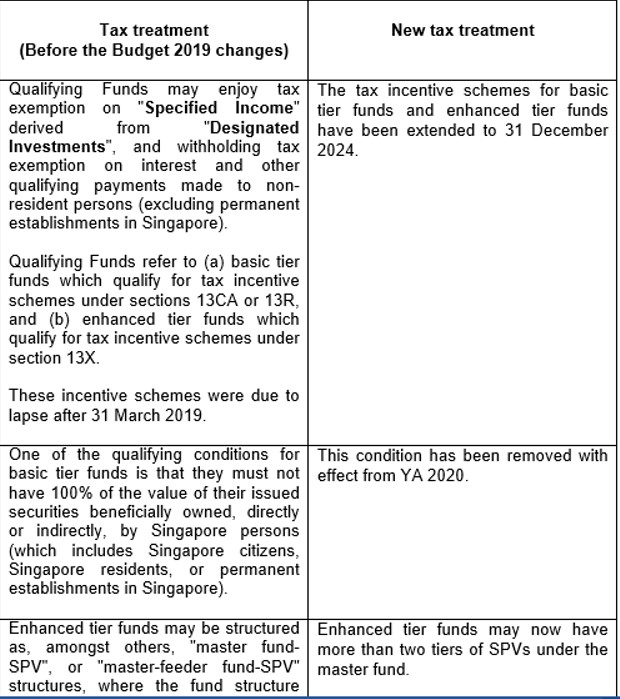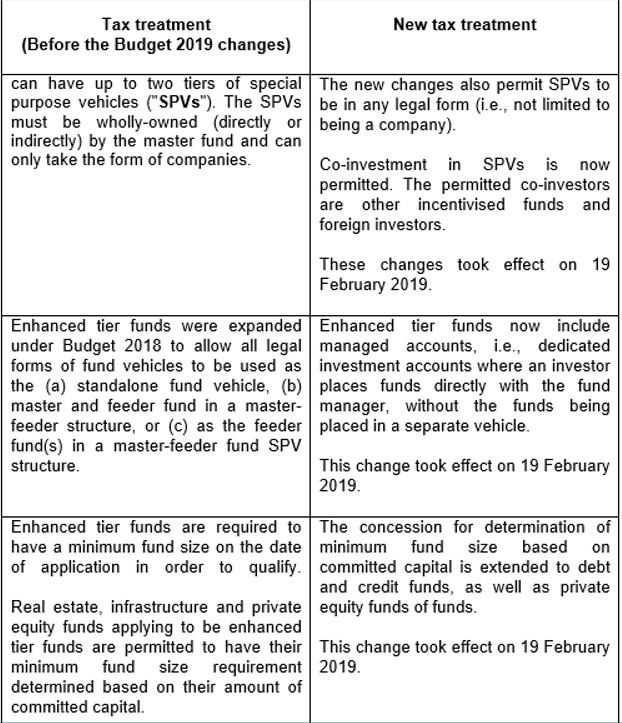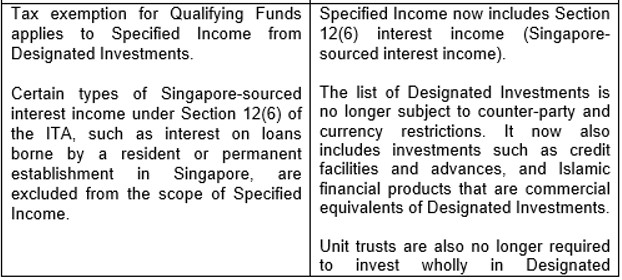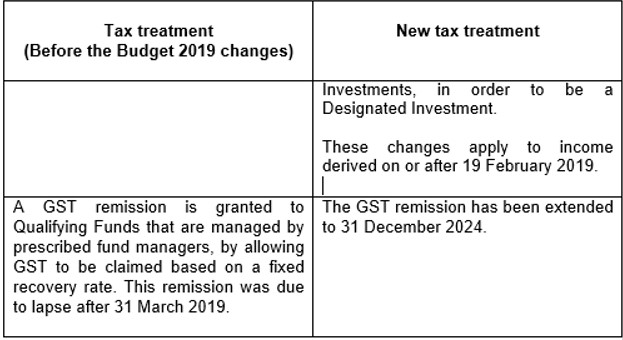Legal
Singapore's Tax, Regulatory Changes - Latest Developments

International law firm Baker McKenzie outlines important regulatory, legal and tax changes affecting wealth advisors and their clients in Singapore and the surrounding area.
International law firm Baker McKenzie lists a range of legal and tax developments affecting wealth planners in the Asia region and beyond. The commentary comes from Dawn Quek, principal, Baker McKenzie Wong & Leow, which is member firm of Baker McKenzie in Singapore; Enoch Wan, senior associate and Jaclyn Toh, associate, at the same organisation.
This publication is grateful for the chance to share these comments and invites responses from readers. This news service does not necessarily endorse all views of guest contributors. Email the editor at tom.burroughes@wealthbriefing.com
1. Enhanced tax incentives for funds managed by
Singapore-based fund managers ("Qualifying Funds")
The Singapore government has continued its efforts in refining
tax incentives to support and increase wealth and asset
management in Singapore. A recent significant change would be the
enhanced incentives for Qualifying Funds, which are commonly used
by asset owning vehicles managed by Singapore family office.
Under Budget 2019, the tax incentives for Qualifying Funds have
been extended to 31 December 2024, and their scope expanded in
terms of eligibility criteria and tax benefits. The key changes
are as follows:




More details are expected to be released by the Monetary
Authority of Singapore by May 2019.
The changes under Budget 2019 are a welcome liberalisation that
will do much to further boost Singapore's status as an asset
management hub, both for private wealth and for third party fund
raising.
The removal of the restriction against 100 per cent beneficial
ownership of basic tier funds by Singapore persons makes the
incentives under Sections 13CA and 13R much more flexible by
allowing fundraising from local investors. This broadens the
range of potential investors and allows for changes in the
composition of the investors which was not previously possible.
Also, it may encourage the creation of Singapore fund vehicles.
The relaxation of the prohibition for Section 13R incentive
against funds with previous businesses in Singapore also
indicates an intention on the Government's part to make
establishment of funds easier and more commercially
practical.
The enhancements to the incentive under Section 13X of the ITA
make it an even more attractive option for fund managers and
wealth managers. The expansion to allow co-investment in SPVs,
multiple tiers of SPVs and SPVs in all legal forms offer
opportunities for more flexible structuring, which can better
suit the commercial needs of both institutional investors and
high net worth individuals.
The inclusion of Singapore-sourced interest, and other income
that falls under Section 12(6) of the ITA, in the list of
"Specified Income" is a significant change that opens up a wide
range of structuring options, and will do much to attract more
financing to flow into Singapore.
In summary, the changes should further boost the attractiveness
of the existing fund incentive regime in Singapore. Taken
together with the fact that these fund incentives will apply to
the Variable Capital Companies regime, Singapore will be at the
forefront of the competition in the asset and wealth management
sectors, both regionally and globally.
2. Fund tax incentive schemes available
to Singapore Variable Capital Companies
The VCC Bill was passed by Parliament on 1 October 2018. The VCC
Bill provides for the incorporation and operation of a new
corporate structure, a VCC, to cater to the needs of investment
funds. The VCC will complement the existing suite of corporate
structures (companies, trusts, and limited partnerships)
available to fund managers in Singapore. The introduction of VCCs
will encourage fund managers to co-locate fund domiciliation with
existing fund management activities in Singapore, building on
Singapore’s strength as a full-service international fund
management centre.
Tax Framework for VCCs
To complement the VCC regulatory framework, a tax framework for
VCCs has been introduced. The introduction of this new tax
framework for VCCs is welcome. Given that the intention is to
encourage investment funds to be set up in Singapore, the
extension of the tax exemption schemes under Sections 13R and 13X
of the ITA respectively to VCCs is critical to support this drive
to enhance Singapore's attractiveness as a jurisdiction for
investment funds.
This tax framework for VCCs aligns the tax treatment for VCCs
with that of other vehicles that are currently commonly used for
investment funds in Singapore. This makes the VCC a genuinely
viable fund vehicle from both a corporate and tax perspective,
and will do much to attract fund managers to set up in
Singapore.
The details of the tax framework for VCCs are as follows:
(a) A VCC will be treated as a company and a single entity
for tax purposes;
A VCC can be set up as a standalone VCC (with no sub-funds), or
as an umbrella VCC (with sub-funds). In both cases, the VCC will
be treated as a single entity for income tax purposes. An
umbrella VCC, and its sub-funds, only needs to submit one set of
corporate income tax return to the Inland Revenue Authority of
Singapore ("IRAS").
VCCs that are Singapore tax residents will be eligible to access
Singapore’s tax treaties. This applies to both standalone VCCs
and umbrella VCCs. The tax residency of VCCs will be determined
based on facts and circumstances, as determined by IRAS.
(b) Tax exemptions under Section 13R and 13X of the ITA
will be extended to VCCs;
Currently, fund vehicles that wish to avail themselves of the
sections 13R and 13X schemes will need to submit tax incentive
applications for MAS’ approval. In the case of an umbrella VCC,
the VCC, which is the legal entity, can apply for the tax
incentives on behalf of its sub-funds. Accordingly, the tax
incentive conditions under both schemes and the corresponding
economic commitments are to be applied on the umbrella VCC (as
opposed to its individual sub-funds).
For additions of sub-funds to an umbrella VCC, there is no need
to inform or seek MAS’ approval, as long as the umbrella VCC (and
its sub-funds) continues to invest within the scope of what the
umbrella VCC fund is mandated to do via its offering document and
approved under either the section 13R or 13X scheme. This is
consistent with the current practice, where there is no need to
inform or seek MAS’ approval for additions of sub-trusts for fund
vehicles structured as trusts.
(c) Expansion of application of concessionary tax rate
under the Financial Sector Incentive - Fund Management
scheme;
The 10 per cent concessionary tax rate under the FSI-FM scheme
will be expanded to include fee income received from managing /
advising VCCs incentivized under sections 13R or 13X of the ITA
("Incentivised VCCs"). MAS will take into consideration both
quantitative and qualitative factors when evaluating the
applications for the FSI-FM award.
(d) The GST remission for funds will be extended to
Incentivised VCCs.
GST is chargeable on fund management, custodian and other
services supplied by GST-registered suppliers to funds belonging
in Singapore.
A GST remission was introduced from 22 January 2009, to simplify
the rules and administrative processes for prescribed funds
managed by prescribed fund managers in Singapore to claim input
tax based on GST principles. Under the GST remission, funds that
meet all the qualifying conditions will be able to recover GST
incurred on expenses based on a fixed recovery rate, without
having to register for GST. The fixed recovery rate is determined
annually based on the proportion of taxable supplies made by the
industry.
The GST remission will be extended to VCCs. To qualify for GST
remission in the current financial year, the VCC must satisfy the
conditions for income tax concession as a section 13R or 13X fund
as at the last day of its preceding financial year. The VCC must
also be managed or advised by a prescribed fund manager in
Singapore. Under the remission, sub-funds of qualifying umbrella
VCCs will be entitled to make input tax claims on GST incurred on
their purchases at the fixed input tax recovery rate.
The GST remission, which was due to expire on 31 March 2019, has
been extended to 31 December 2024, per the Budget 2019
announcement.
3. Increase in Additional Buyer's Stamp
Duties ("ABSD")
The Singapore Government raised ABSD rates and tightened
loan-to-value ("LTV") limits on residential property purchases
with effect from 6 July 2018. The increased duty imposed on
buyers would likely help in curbing excessive demand.
Generally, ABSD rates will increase by 10% for all entities and
by 5 per cent for all individuals other than Singapore Citizens
and Singapore Permanent Residents purchasing their first
residential property. ABSD rates for developers purchasing
residential properties for housing development will increase by
15 per cent.
In addition, LTV limits have been tightened by five percentage
points for all housing loans granted by financial institutions.
These revised LTV limits do not apply to loans granted by the
Housing and Development Board.
The ABSD rate depends on the profile of the buyer. For
acquisitions made jointly by two or more parties of different
profiles, the applicable rate will be based on the profile with
the highest ABSD rate. A summary of the changes to the ABSD rates
can be found in the table below:

4. Singapore and US sign Tax
Information Exchange Agreement ("TIEA") and the reciprocal
Foreign Account Tax Compliance Act Model 1 Intergovernmental
Agreement ("FATCA IGA")
On 13 November 2018, Singapore and the US signed a
TIEA.
The TIEA allows the competent authorities of Singapore and the US
to request for and exchange information that is “foreseeably
relevant” to the administration and enforcement of domestic tax
laws. It also sets out the scope of information that can be
exchanged, procedure to follow, as well as the limitations on the
exchange of information.
The scope of the TIEA casts a wide net over information that may
be exchanged under the TIEA. Persons in possession or control of
information should be mindful of the scope of the TIEA. Equally,
the limitations of the TIEA and avenues to reject requests for
the exchange of information are relevant and such persons should
be aware of their rights and obligations when a request is made
by a competent authority to exchange information.
Singapore also signed the FATCA IGA with the US on 13 November
2018. While the FATCA IGA has been signed, it has not been
ratified and does not yet have the force of law in Singapore and
in the US.
5. The standard for assessing Exchange
of Information ("EOI") requests, and the application of
discretion under the statutory framework of the EOI
regime
In the case of AXY & Ors v Comptroller of Income Tax [2018] SGCA
23, the Court of Appeal clarified that the standard for assessing
an EOI request remains that of "foreseeable relevance", and the
amendments made to the EOI regimed by the Income Tax (Amendment)
Act 2013 did not change the standard; it merely altered the
identity of the authority that was to make this determination
from the court to the Comptroller of Income Tax.
The Comptroller is afforded a wide discretion in dealing with EOI
requests and is generally not expected to go behind the
assertions made by a foreign tax authority in an EOI request.
6. Phasing out of
Not-Ordinarily-Resident ("NOR") scheme
The NOR scheme was introduced in Budget 2002 to attract talented
individuals to relocate to Singapore to complement Singapore's
talent pool. It extends favourable tax treatment to qualifying
individuals for a period of five consecutive years, subject to
certain conditions being met.
During Budget 2019, it was announced that the NOR scheme will be
phased out. The last such NOR status will be granted for YA 2020
(i.e., for income earned in 2019) and expire in YA 2024. For
those individuals already accorded the NOR status, they will
continue to benefit from the NOR tax concessions until the expiry
of their NOR status, subject to meeting all prescribed
conditions.
Over the years, Singapore has been successful in attracting
global talent to complement our local talent in order to drive
Singapore's economy forward, creating the vibrant and competitive
business landscape of today. The phasing out of the NOR scheme
suggests that it has achieved its purpose. It is also an
acknowledgement that today's Singapore has a lot more to offer
(e.g. highly rated education system, an efficient transport
system) in its efforts to attract and retain highly-skilled
individuals.
